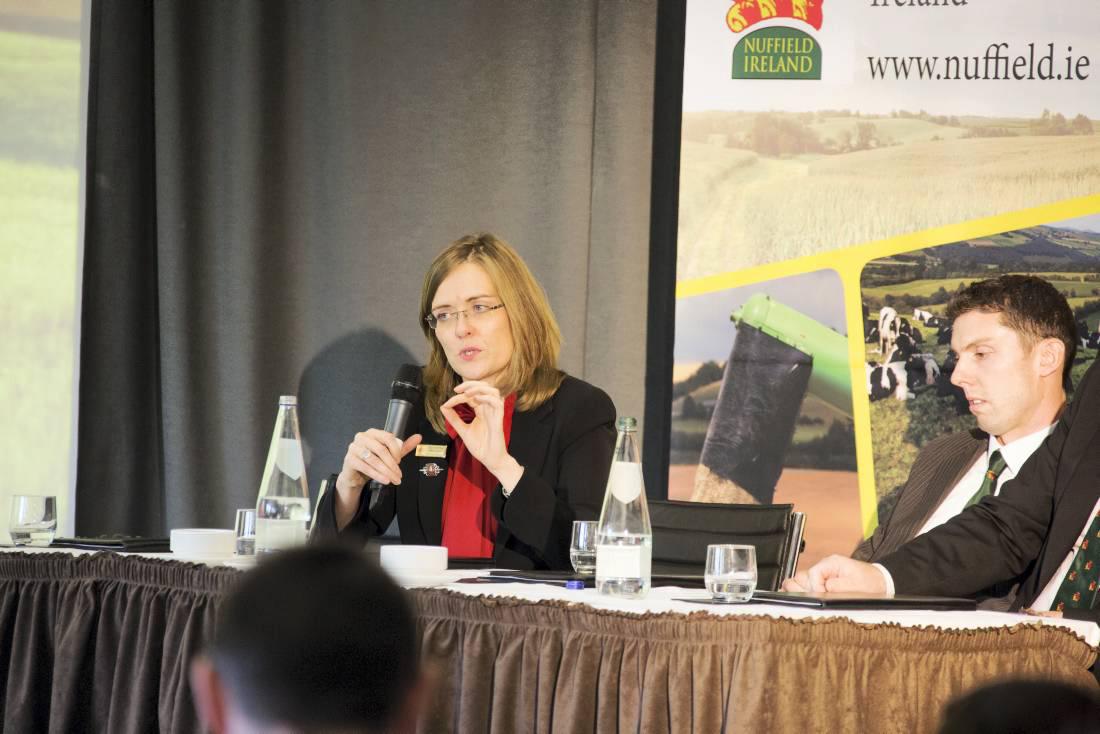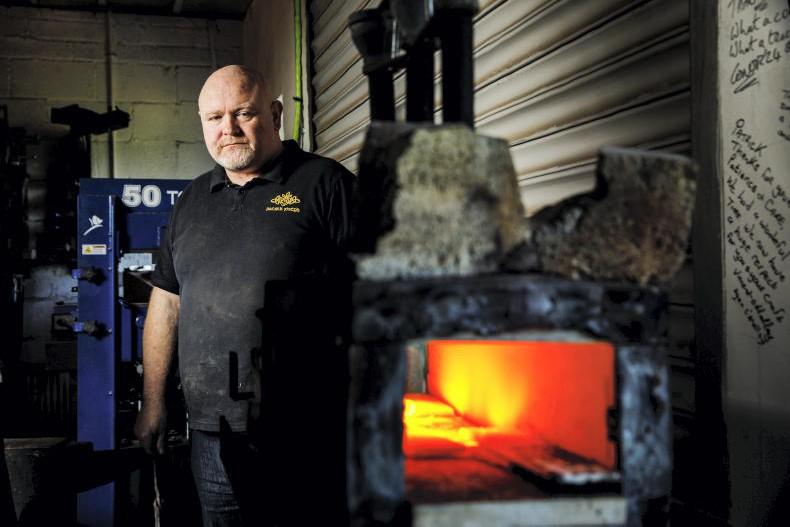She recently presented the report at the 2014 Nuffield Ireland conference.
This is her report summary*:
Objectives
Gain consensus on the values and competencies of individual leadership at community, regional, national and potentially international levels. Determine the processes of development that have brought successful Irish and international leaders to where they are today.Key Findings
Strategy
Australia, Canada, the United States and New Zealand have all established a strategy for leadership development as best practice for agriculture, either in specific sectors of agriculture or for the sector as a whole. To realise this strategy, these countries consulted and evaluated the leadership requirements to progress economic growth and promote rural development. They also set up frameworks to provide support for leadership development through early leadership opportunities, formal courses, mentoring and other initiatives, and identified leadership development opportunities either to develop, or that were based on, competence.
The EU, under Article 36, rewards shared or collaborative leadership skills through programmes and initiatives such as ‘organised groups’, collaborative arrangements and initiatives that foster entrepreneurship and innovation.
Tiers
Leadership development has different requirements for different levels of representation. These levels have been captured using tiers or stages of leadership engagement.
Tier 1: leaders working in the industry taking their first steps in leadership, largely on an individual basis.Tier 2: leaders working in collective arrangements across cooperative companies, partnerships, processors and other agencies and organisations.Tier 3: leaders working at national or international level to influence government or international policy.At all of these levels, leadership development was seen as key to the medium and long-term success of enterprise, whether
it’s at farm, organisation or national level.
Pathways to leadership development:
Some of those interviewed were initially reluctant to identify with the title ‘Leader’ as it is perceived as elitist. However, when the idea was presented as ‘coming up with a vision for the future, and having the ability to communicate this vision together with the steps to get there’ interviewees associated with this. There is a need to demystify leadership jargon so that individuals can self assess, acknowledge their strengths, and areas for development.Leadership development was found to have many sources, both formal and informal. Key development sources:- Shared knowledge and experience, including mentors and travel
- Learning through action and experience
- Continual learning
Effective leadership requires competencies (knowledge, skills and attitude) in both: - self-leadership, the ability to manage and lead oneself
- shared-leadership, the ability to lead, and be led by others
All of the leaders interviewed held guiding principles in how they operated, including honesty, courage, trust, respect and integrity.Developing effective followership is as critical as developing leadership. Effective followership ensures that the leader-follower relationship produces the dynamics necessary to deliver the mission. Effective leadership and followership will ensure the accomplishment of the goals of FH 2020 Recommendations
These steps are recommended to develop longer term standards and competencies, to develop leadership at all levels, and also to provide real leadership opportunities to those that aspire to them, to improve the capacity of farmers and the competitiveness of Irish agriculture.
1. This report recommends that the Agricultural Trust lead the way by putting together the best leadership advisors in the agri-food and business sectors and form a Leadership Trust.
2. The Trust to challenge Irish Co-ops, food processors and other agri-food organisations to ensure that their board members are appointed based on competence rather than politics, through defined Board competencies and standards of continuous skills development of Board members.
3. Interviewees have proposed €500,000 a year, contributed by industry stakeholders to cover a “home” of leadership and support as a minimum 50/50 funding of leadership programs at Tiers 1, 2 & 3.
4. Integrate personal development and self-leadership for adult farmers as part of knowledge transfer courses in the forthcoming Rural Development plan. In developing self-leadership, farmers have the potential to become effective followers, to influence their environment, both immediate and the community.
5. Teagasc to establish a working group to develop soft skills development programmes, initially by developing a small number of modules and adding to programmes over time.
She recently presented the report at the 2014 Nuffield Ireland conference.
This is her report summary*:
Objectives
Gain consensus on the values and competencies of individual leadership at community, regional, national and potentially international levels. Determine the processes of development that have brought successful Irish and international leaders to where they are today.Key Findings
Strategy
Australia, Canada, the United States and New Zealand have all established a strategy for leadership development as best practice for agriculture, either in specific sectors of agriculture or for the sector as a whole. To realise this strategy, these countries consulted and evaluated the leadership requirements to progress economic growth and promote rural development. They also set up frameworks to provide support for leadership development through early leadership opportunities, formal courses, mentoring and other initiatives, and identified leadership development opportunities either to develop, or that were based on, competence.
The EU, under Article 36, rewards shared or collaborative leadership skills through programmes and initiatives such as ‘organised groups’, collaborative arrangements and initiatives that foster entrepreneurship and innovation.
Tiers
Leadership development has different requirements for different levels of representation. These levels have been captured using tiers or stages of leadership engagement.
Tier 1: leaders working in the industry taking their first steps in leadership, largely on an individual basis.Tier 2: leaders working in collective arrangements across cooperative companies, partnerships, processors and other agencies and organisations.Tier 3: leaders working at national or international level to influence government or international policy.At all of these levels, leadership development was seen as key to the medium and long-term success of enterprise, whether
it’s at farm, organisation or national level.
Pathways to leadership development:
Some of those interviewed were initially reluctant to identify with the title ‘Leader’ as it is perceived as elitist. However, when the idea was presented as ‘coming up with a vision for the future, and having the ability to communicate this vision together with the steps to get there’ interviewees associated with this. There is a need to demystify leadership jargon so that individuals can self assess, acknowledge their strengths, and areas for development.Leadership development was found to have many sources, both formal and informal. Key development sources:- Shared knowledge and experience, including mentors and travel
- Learning through action and experience
- Continual learning
Effective leadership requires competencies (knowledge, skills and attitude) in both: - self-leadership, the ability to manage and lead oneself
- shared-leadership, the ability to lead, and be led by others
All of the leaders interviewed held guiding principles in how they operated, including honesty, courage, trust, respect and integrity.Developing effective followership is as critical as developing leadership. Effective followership ensures that the leader-follower relationship produces the dynamics necessary to deliver the mission. Effective leadership and followership will ensure the accomplishment of the goals of FH 2020 Recommendations
These steps are recommended to develop longer term standards and competencies, to develop leadership at all levels, and also to provide real leadership opportunities to those that aspire to them, to improve the capacity of farmers and the competitiveness of Irish agriculture.
1. This report recommends that the Agricultural Trust lead the way by putting together the best leadership advisors in the agri-food and business sectors and form a Leadership Trust.
2. The Trust to challenge Irish Co-ops, food processors and other agri-food organisations to ensure that their board members are appointed based on competence rather than politics, through defined Board competencies and standards of continuous skills development of Board members.
3. Interviewees have proposed €500,000 a year, contributed by industry stakeholders to cover a “home” of leadership and support as a minimum 50/50 funding of leadership programs at Tiers 1, 2 & 3.
4. Integrate personal development and self-leadership for adult farmers as part of knowledge transfer courses in the forthcoming Rural Development plan. In developing self-leadership, farmers have the potential to become effective followers, to influence their environment, both immediate and the community.
5. Teagasc to establish a working group to develop soft skills development programmes, initially by developing a small number of modules and adding to programmes over time.









SHARING OPTIONS